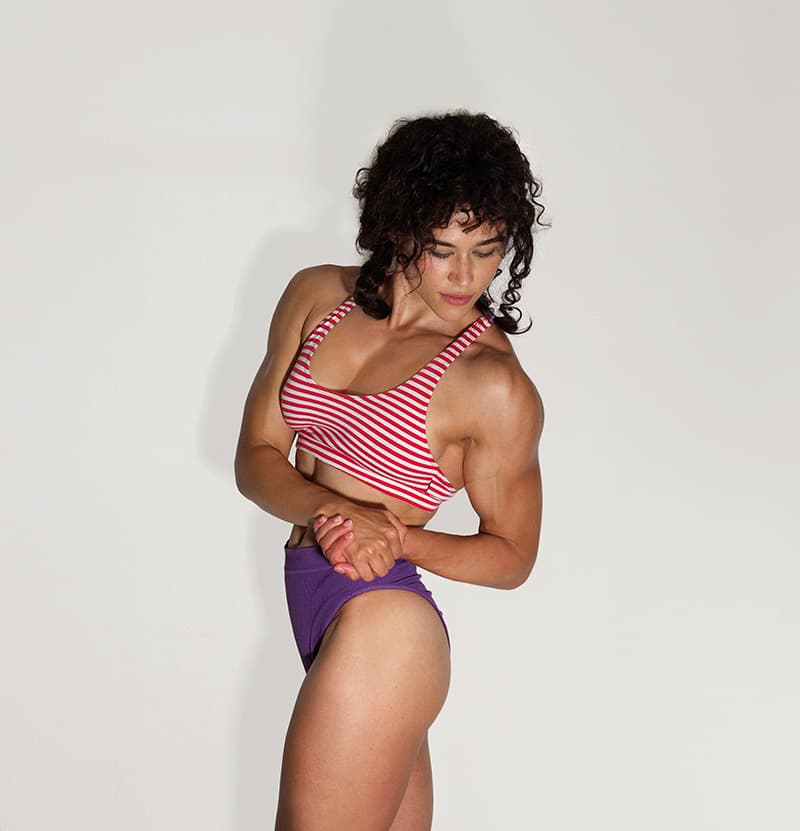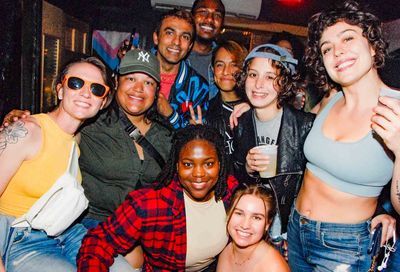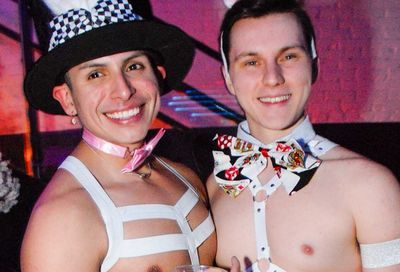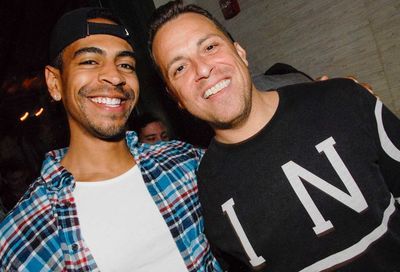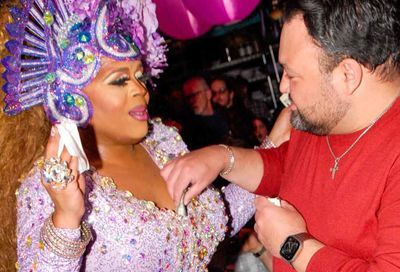Sprinkle's On Top
Porn star, performance artist, educator and activist, Annie Sprinkle, Ph.D., is coming to Washington
Even if you’re not familiar with straight pornography of the 1970s and ’80s, there’s still a reasonable chance you’ve heard of Annie Sprinkle. As an outspoken and articulate advocate of sexual liberation and exploration, she’s lectured, filmed, written and ”workshopped” the topic of sex from every conceivable angle.
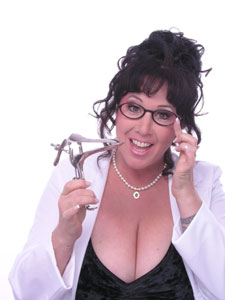
Annie Sprinkle
Photo by Randal Alan Smith
The adventure continues today with Sprinkle — Ph.D. of human sexuality in hand — exploring monogamy with her partner and fellow academic/artist, Elizabeth Stephens. Together they’ve created Love Art Lab, a vehicle for them to explore love, particularly weddings. Annually, since 2005, they’ve been married in grand, performance-art spectacles, including a legal Canadian marriage as part of the couple’s 2007 wedding that celebrated power and courage.
Having survived breast cancer and experienced menopause, power and courage seem apt. But those are just two flavors of Annie Sprinkle, who focuses more on loving than fighting. On Saturday, April 4, Sprinkle will be speaking at this year’s Visions in Feminism conference at the American University.
”What these folks are trying to do is really important,” she says. ”I’m coming a long way because I believe in feminism. If you don’t believe in feminism, come. If you do believe in feminism, come. No pun intended. Wait — pun intended!”
METRO WEEKLY: Legally marrying Beth in Canada, was that practical, personal or political?
ANNIE SPRINKLE: It is political. When I crossed the border into Canada and thought, ”I can get legally married here,” I teared-up. It was really moving. If we were allowed to [marry] in the United States, we might have, we might not have. But the fact is because we can’t get legally married here, Beth has to pay more taxes than her heterosexual colleagues. There are rights that we don’t have. If one dies, then it’s always harder, more complicated to deal with wills. Now it’s a little better since we are domestic partners. We can get into the hospital room now. But I remember the AIDS crisis and partners not being able to get into hospital rooms.
It was also art for us. The work we’re doing is celebrating love, exploring love. I wanted to see what it was like. It was an experiment. The first year, we married each other and began the [interactive performance art weddings]. The second year, we married our community and had oranges with vows written on them: a hundred vows to our community. The third year, we had the legal wedding. The fourth, we married the earth. And now we’re blue and we’re going to marry the sky in England.
It’s a really fun project. While the weddings are really sexy and sensual, they feel good. The idea is to create a vibration of feeling good and happy as an alternative to fear and greed. So we decided rather than protesting the war all the time, and being angry, we would create what we want, which is a world that has more celebrations of love and times where you feel really good and yummy.
I like curmudgeons, kvetching, people who are ironic. But cynicism, it’s hopeless. Optimism? I think it’s a survival mechanism.
Looking back over my porn career, I forget all the crappy stuff and just remember the good stuff. I can even look back at AIDS – the ”days of the great dying” I call it – it was like going through war, and I can still see all the positive things, the beauty of it, too: families coming together, the love that was generated.
Looking at the bright side just lubricates you through life. It’s like lubricant. It’s how I prefer to live. I did work about sex for several decades, but now it’s more about love. And that includes Beth, of course.
MW: Now you’re coming to Washington, which is not really synonymous with either sex or love. Have you been to D.C. much?
SPRINKLE: We were at American University before. We gave a talk and did a free ”sidewalk sex clinic,” where we gave out free sex advice on campus.
I was there with a woman who does ”passion parties.” We usually gather five or six sex experts and put out tables and chairs and offer the public free sex advice. We have a big sign offering advice from sex experts. It’s really fun. I think that was about three years ago. Then I was in Baltimore at a place called Load of Fun. It’s a really cool art gallery and performance space. I did some performances there — and a sidewalk sex clinic! That’s one of my favorites. It’s kind of a performance art piece. We all wear white lab coats and it’s fun.
MW: Is the advice serious?
SPRINKLE: Sometimes yes, sometimes no. Usually it is. Sometimes people don’t realize – especially college students – that there’s lots of free sex advice available. You don’t have to be in this mystery. It’s okay to talk about it. People sometimes don’t realize that. Or they’re not willing to pay a sex therapist or a marriage and family counselor, or have a chance to meet a prostitute or a porn star, somebody who’s been around the block. It opens the door for people, even just seeing a sidewalk sex clinic if they pass by.
MW: Perhaps you could set one up in front of the Capitol while you’re here.
SPRINKLE: That’s a good idea. You know I make ”tit prints” with my breasts, and I did make a Washington Monument tit print.
MW: You could present one to the Obamas.
SPRINKLE: [Laughs.] Yeah, I could. If I had an audience with the Obamas I’d probably do some other type of performance. I’d have to think about it.
I like Washington. I’ve been there for a number of marches. I’ve always loved the Lincoln Memorial. Although I just heard the statistics about AIDS there. That’s heavy.
MW: We recently got data from the District’s HIV/AIDS Administration, and they’re reporting a 3 percent infection rate. That’s only people who’ve been tested. It’s not good. Many activists, clinicians I’ve spoken with, point to stigma as a playing a big role in the infection rate here. You’ve been fighting stigma for most of your life. How do you fight stigma, whether it’s about drug use or sex? Any advice?
SPRINKLE: For me, the stigmas I fight, it’s always from a belief that what I’m doing is valid and from the heart. Or, at least, through the prosecution of pornography, I always felt like there shouldn’t be laws about what comes naturally, frankly. A victimless crime. These shouldn’t even be crimes. It really comes from a belief in justice, wanting a more just world, a fair world, a loved world.
When it comes to drugs, it’s harder somehow. Although I’ve tried all the drugs, and I’m glad I did. I learned a lot. I was never an addict. I’m not a drug addict, but I’m a cookie monster. Does that mean we should take away cookies?
How do we fight that stigma? We come out. Like Harvey Milk says, ”Come out, come out, wherever you are.” Be out and proud and let people get to know you. Lots of things are stigma, are scary. The only way to combat that is to talk to people, education, outreach.
I did a performance called The Legend of the Ancient Sacred Prostitute, where I would take my vibrator out and masturbate. I wouldn’t really call it masturbate, because it was really with the whole audience, circulating energy from the audience. I would take prayers and wishes for the divine, like the ancient prostitutes used to do. Of all the things I’ve ever done, it was really the most interesting. I could feel really embarrassed, or I could really get into the role of the ancient, sacred prostitute and really have no shame about it.
It really comes from within. Even being a sex worker. If you have to tell your parents you’re a sex worker, it’s how you feel about it that affects how they feel about it. If you have shame and guilt and you’re embarrassed about it, your parents are going to pick that up. If you’ve worked on your own issues, any guilt or shame that you have, and you feel proud of your work and truly believe in what you do, they’ll pick that up.
Face it, there are stigmas about bodies, race, religion, cliques. Most people deal with it every day to some extent. But it’s how you feel about yourself that matters. As you walk through the world, if you’re embarrassed about who you are — whether it’s that you’re Greek, or Spanish, or white, or whatever it is.
And feminism is getting a bad rap. There are little feminist groups on campuses, and they’re fighting stigma.
MW: You were born in 1954, right there for the feminism of the 1960s and ’70s, the fight for the Equal Rights Amendment.
SPRINKLE: Both my parents were very much feminists. It was assumed early on, when I was in my 20s, that feminists were against porn, imagery that I was into. So then I thought, ”Okay, I must not be a feminist.”
Then, when I went to college later, in my late 20s, early 30s, I took a feminist-studies course and learned what it really was to be a feminist. Then we also kind of made this idea of the sex-positive feminist or the pro-sex feminist. I then I thought, ”Okay, I am a feminist.”
My mom’s still very much a feminist. She was always pretty horrified that I was in porn and prostitution. I was pretty honest from the beginning. When I was 18 I got into that as a young hippie and I told them. She was always concerned I was using drugs, someone was forcing me. After many years, she took a women’s-studies course and they brought my name up in the course. That was a very healing moment for her: ”Oh, I’m Annie Sprinkle’s mother.” [Laughs.] Someone asked her for her autograph, and now I’m a feminist.
MW: How would you define feminism?
SPRINKLE: My definition is that I love and adore women and I want the best for them — health care, education, opportunities, equal pay. I just want them to have the best possibilities, opportunities. That includes wanting it for men and for trans people. I have a big place in my heart for trans people.
MW: With feminism and trans women, there can be friction. The Michigan Womyn’s Music Festival, for example, which is affirming for women, has not been inclusive of trans women.
SPRINKLE: I haven’t gone to the festival for that reason. I’m part of the trans community and I really don’t like that. Trans people are very special. They should be welcomed because they’re so magical and wonderful and special.
The funny thing is I just won a ticket to go to the festival! Of course, I was asking them about this issue and they said, I guess it’s a policy, but that trans women do go, that all kinds of women are welcome.
MW: So you might be going this year?
SPRINKLE: Hmmm. A chance. I have to find out more about that policy. People who go tell me there are lots of trans women. We’ll see.
MW: In what way do you identify as a member of the trans community?
SPRINKLE: Not as a trans person, but as a trans lover and trans fetishist. I was like the original trans fetishist. I did the first [female to male] porn movie, in 1989: Linda/Les and Annie: The First Female-to-Male Transsexual Love Story. It played all over the world.
MW: I want your perspective on another corner of our community, where I think your insights as a porn star, prostitute, activist and artist are all invaluable: bareback porn. In the gay-male community, bareback porn is very popular. But is it ”sero-sorting” as a form of safer sex? Glorification of dangerous behavior? What’s your take?
SPRINKLE: Different people have different messages or motivations. When AIDS hit, I lost quite a few friends and lovers. Quite a lot. I tested negative myself, miraculously. I switched to all safe sex, because I wanted to explore how to do safe sex, because it didn’t exist before that. The thought of having sex without body fluids was like, no way! How do you do that? What’s the point? But I learned how to do it so I could do it on camera. I was interested in saving lives, so I switched to doing safe sex in all the films I made. At that point, it was fewer films than before, but I was making some. That was my motivation. I tried to start a group called Pornographers Promoting Safer Sex, but nobody really wanted to do it. For a long time, people didn’t come around.
But another person might have a different motivation. For example, if I was HIV-positive, my motivation might want to be that I can still really enjoy sex, and to relieve stigma. I don’t know what I would do if I was HIV-positive and making porn. I might absolutely want to show that.
Other people have different motivations. I can’t really put myself in their positions. I do what I do. But I wouldn’t want to put anyone in a vulnerable position. I’d feel horrible if I did. I did, it turns out, put people in vulnerable positions unknowingly, before we knew about how AIDS happens. I just wouldn’t want the responsibility.
Then again, if I was a director who was HIV-positive? Who am I to judge? Different people have different motivations for doing what they do, and I think that’s a good thing. It’s a good conversation to have.
I think watching safe-sex porn is hot, because it shows that people are responsible and caring. It worries me watching 19-year-olds getting fucked in the ass without a condom. It’s like nails on a chalkboard. That’s just me. As an older person, I do feel a certain responsibility for younger people. I know when I was 18 or 19, I was invincible. I took so many risks that I wouldn’t take now. I know better.
MW: With your Love Art Lab project, you promote love as the new sex. What does that mean?
SPRINKLE: In the ’70s and ’80s, making porn, promiscuity and kink, all that was kind of a taboo. It was sort of edgy. But now, everybody’s doing that. Everybody’s making porn, everybody’s kinky, everybody wears fetish gear. That’s like normal now
So what’s the newest edge? What’s taboo? It’s love and sensuality and commitment. Deeper intimacy. If I say I’m doing work about love, people go, ”Eeeew! Love? That’s so Hallmark.” It has this stereotype. That’s why we’re so interested in it. We’re artists. We’re kind of trying to reclaim love from Hallmark.
We met these two really hot gay porn starts in Spain. They actually fell on love on camera when they met. They were making a porn movie and they fell in love. They were so deeply into each other, on such a deep level, that they couldn’t sell the scene. It ended up on the cutting-room floor. That’s a scene I want to see. But it was too deep, too intimate for people.
It’s like prostitutes not kissing their clients. Porn stars don’t kiss in porn much. So we do all these performances about kissing, two-hour kisses, three-hour kisses, kiss workshops. In a way, it’s almost more intimate than fucking now. I know lesbians who will fuck, but they won’t kiss unless it’s a committed relationship.
So, love is the new sex is saying that’s the new edge almost. It’s kind of a full circle. It’s ”radical traditionalist.” In the ’60s we were breaking out of the ’50s idea of getting married and having two kids. We broke out of that and had lots of sex. I’m going to have sex with 3000 people! We’re not going to get married.
So we’ve done that. Now what? Now I’m a monogamist. Beth and I are monogamous. We call it ”adventurous monogamous.” There’s a whole kind of liberation that comes from monogamy. It’s another experiment. In my world, monogamy’s kinky, it’s taboo. It’s even frowned upon.
MW: Do you identify with a particular sexual orientation?
SPRINKLE: I can’t stand ”bisexual” because there are more genders than bi. And I really think of the earth as my lover. I’m ”eco-sexual,” you could say.
The fact is, I’m in a relationship with a woman I adore, hopefully for the rest of my life — I never would’ve said that before, but there’s something edgy about talking about staying together for the rest of our lives. Wow, what a concept. I never thought I would do that with anybody.
I love men. I love trans people. Having to say bisexual implies there are two genders, when there are trans people and androgynous people. So that doesn’t really fit.
We have a husband, Joseph Kramer. He’s a psychologist. He and I went and got Ph.D.s together – his and hers Ph.D.s. He’s a sex educator. He started the Body Electric School of erotic massage. We do massage rituals together. We’re very committed to him as well.
We were just Mexico and I just bought Beth a lap dance from a very hot Mexican gal. We have our little adventures like that.
MW: Through so many twists and turns, what sort of place are you at in your life now?
SPRINKLE: What I’m really into now is collaborating with my partner about love. I’m 54 years old, still doing it freelance. Since I was 18, I’ve been freelance. Luckily, I have a partner now, who I adore.
I just went through menopause, which was interesting. It was much more intense than I’d thought. I learned that we’re a lot about our hormones. I also had a breast cancer a few years ago. We actually had fun with it. I was fortunate enough that they caught it early, so we could have fun, have art projects and get through it. I’m fine now. I did chemo and radiation. The chemo kind of puts you right into menopause. The hormone thing was really intense. I cried. In fact, I still feel it sometimes. I’ll wake up at night feeling this rush of hormones. It’s similar to puberty. It’s a little challenging. On the other hand, I feel, in a way, more happy with who I am. In a lot of ways.
MW: Is it physical, spiritual, psychological?
SPRINKLE: For me, menopause is a shift in energy, emotions. It’s hard to describe, just like puberty. I think I’m coming out of it now — I’m still sorting it out. It’s been a couple years, but it’s still a mystery.
The Visions in Feminism 2009 conference, ”Pushing Boundaries: Queering Feminism & Queer-ying our Communities,” is Saturday, April 4, at the American University, 4400 Massachusetts Ave. NW, Ward Building, from 8 a.m. to 5:30 p.m. Tickets are $10 in advance, $15 at the door. For tickets or more information, visit http://vifconference.wordpress.com. For more on Annie Sprinkle, visit www.anniesprinkle.org. For Love Art Lab, visit www.loveartlab.org.
Support Metro Weekly’s Journalism
These are challenging times for news organizations. And yet it’s crucial we stay active and provide vital resources and information to both our local readers and the world. So won’t you please take a moment and consider supporting Metro Weekly with a membership? For as little as $5 a month, you can help ensure Metro Weekly magazine and MetroWeekly.com remain free, viable resources as we provide the best, most diverse, culturally-resonant LGBTQ coverage in both the D.C. region and around the world. Memberships come with exclusive perks and discounts, your own personal digital delivery of each week’s magazine (and an archive), access to our Member's Lounge when it launches this fall, and exclusive members-only items like Metro Weekly Membership Mugs and Tote Bags! Check out all our membership levels here and please join us today!




